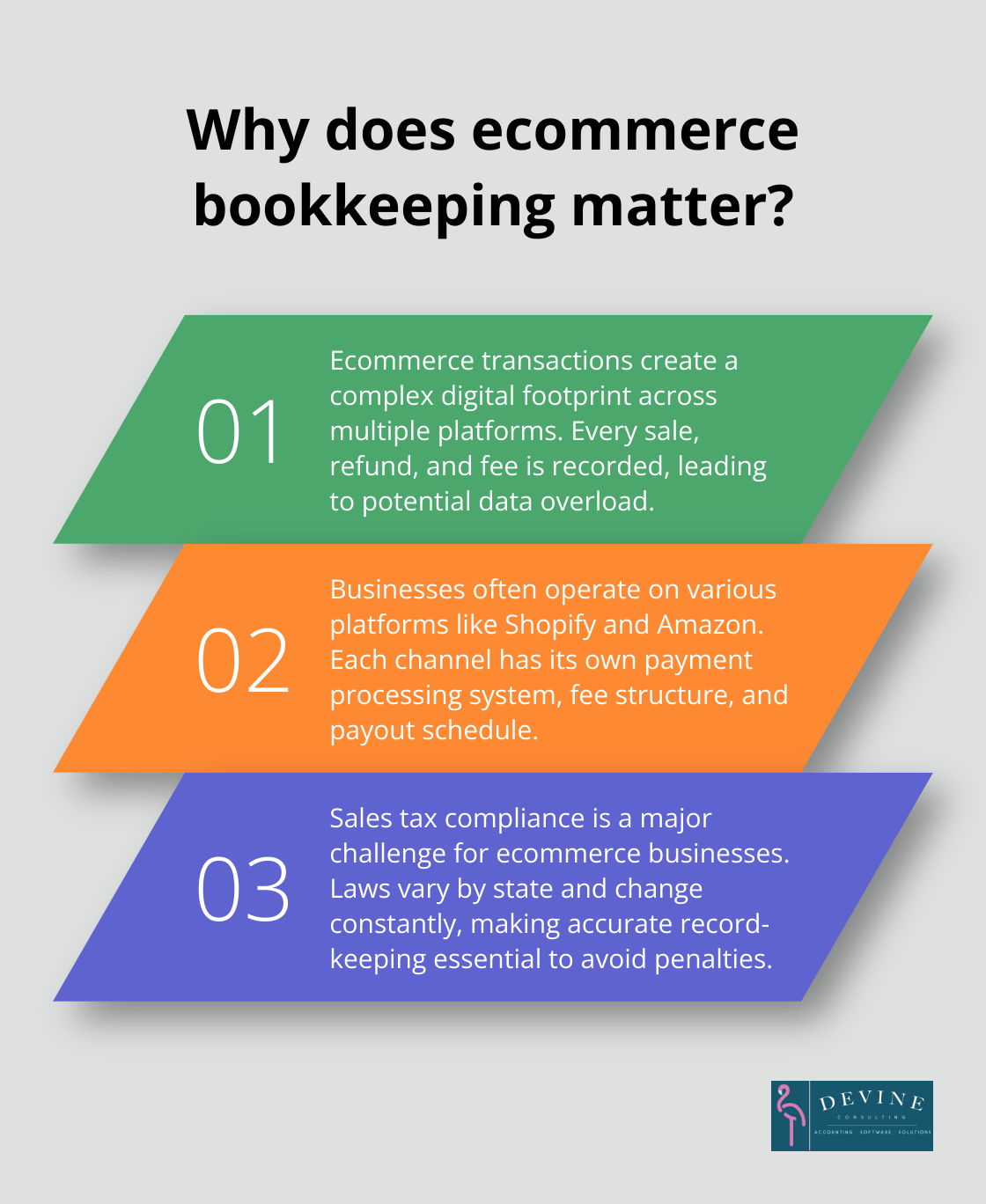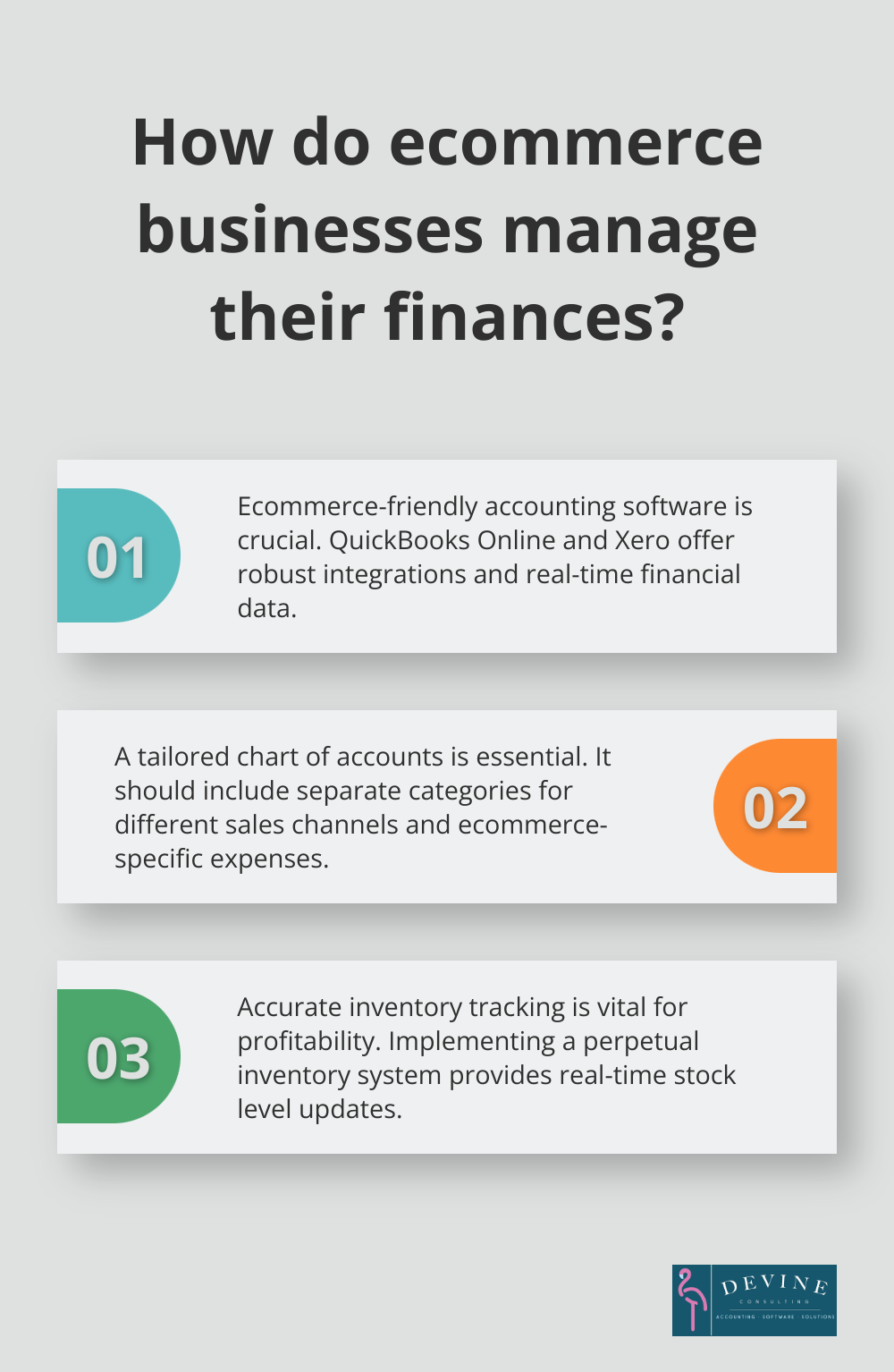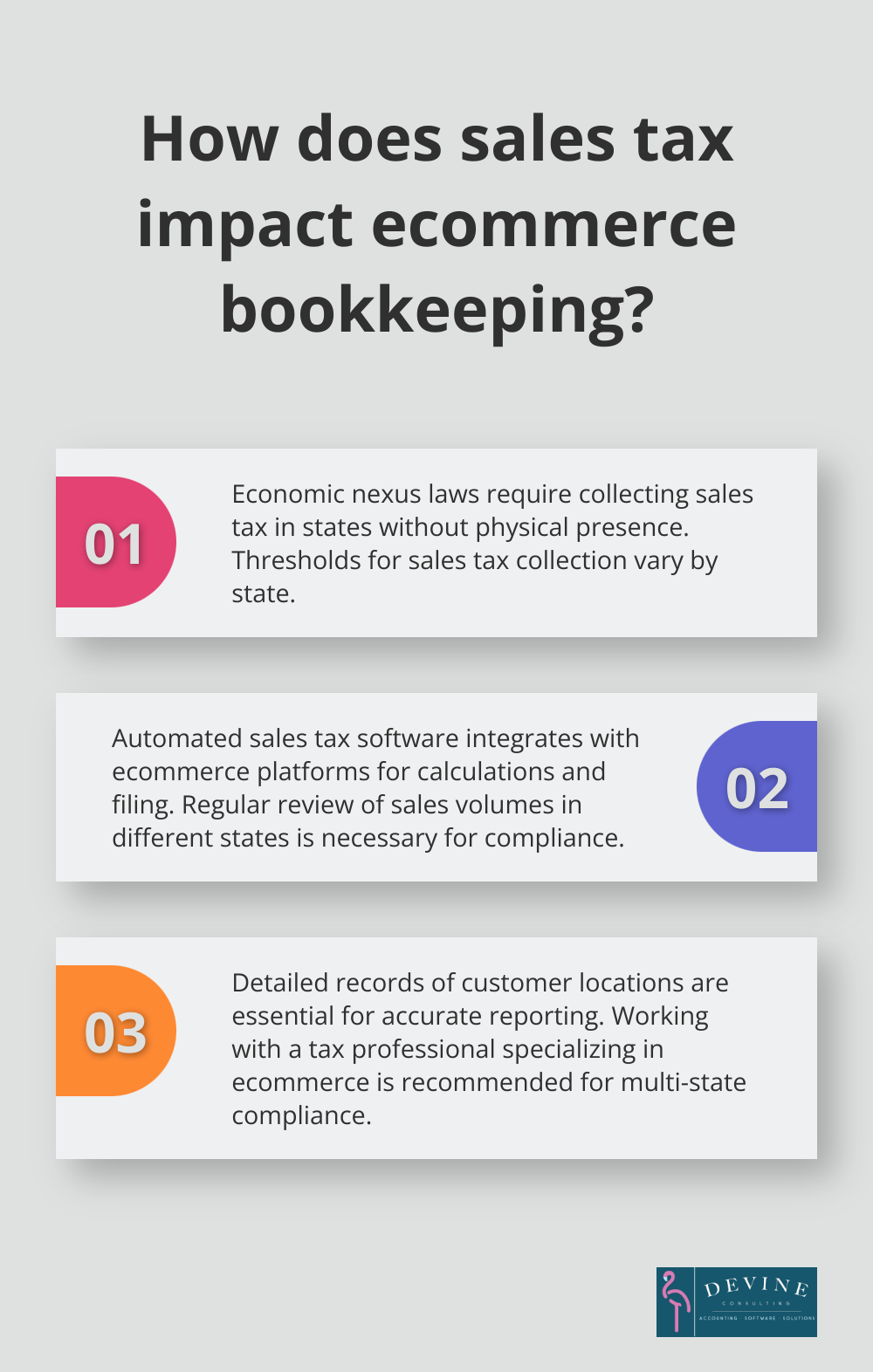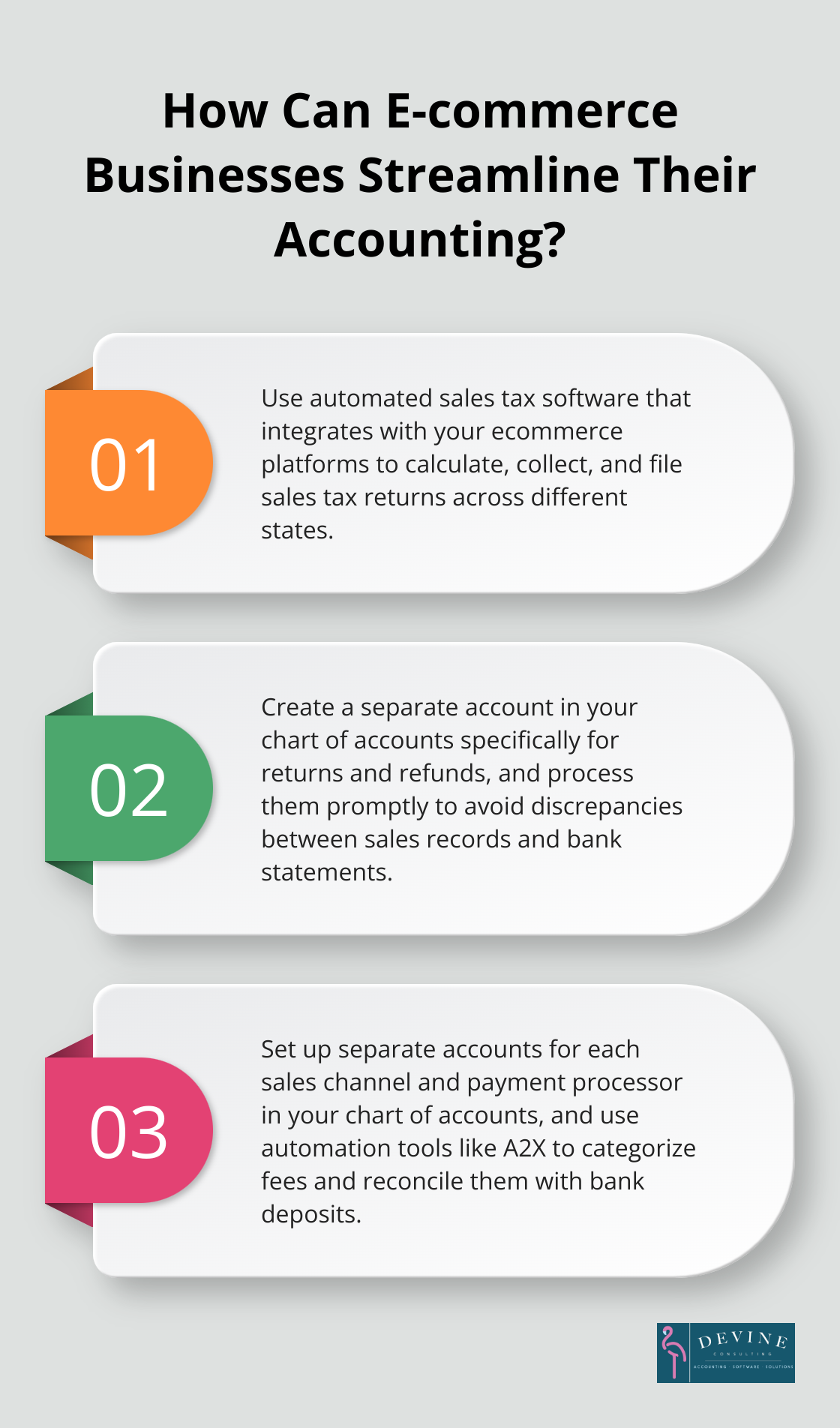How to Master Ecommerce Bookkeeping for Your Business
Ecommerce bookkeeping is a critical aspect of running a successful online business. It’s more complex than traditional bookkeeping due to multiple sales channels, digital payment processors, and cross-border transactions.
At Devine Consulting, we’ve seen many ecommerce businesses struggle with these financial challenges. This guide will help you master the essentials of ecommerce bookkeeping and set your business up for long-term success.
Why Accurate Financial Records Matter in Ecommerce
The Digital Paper Trail
Ecommerce bookkeeping forms the backbone of a thriving online business. Unlike traditional retail, ecommerce transactions create a complex digital footprint. Every sale, refund, and fee gets recorded across multiple platforms. This data overload can quickly overwhelm businesses without a structured approach to bookkeeping.
Navigating Multi-Channel Complexity
Ecommerce businesses often operate across various platforms (like Shopify, Amazon, and their own websites). Each channel has its own payment processing system, fee structure, and payout schedule. Accurate financial records allow you to track revenue and expenses across all these channels, providing a clear picture of your overall financial health.
The Sales Tax Maze
One of the biggest challenges for ecommerce businesses is sales tax compliance. With laws that vary by state and change constantly, keeping accurate records becomes essential to avoid penalties. Tools can help automate this process, but the foundation lies in meticulous bookkeeping.
Financial Statements: Your Business GPS
For ecommerce businesses, three key financial statements act as a GPS for your financial journey:
- Income Statement: This shows your revenue, expenses, and profit over a specific period. It helps you understand your business’s profitability.
- Balance Sheet: This snapshot of your assets, liabilities, and equity helps you assess your business’s financial position at a given moment.
- Cash Flow Statement: This tracks the flow of cash in and out of your business, helping you manage inventory purchases and other expenses (particularly important for ecommerce).

These statements, when accurately maintained, provide invaluable insights for decision-making and growth planning.
The Role of Professional Support
While many ecommerce entrepreneurs start by managing their own books, the complexity of online retail often necessitates professional help. Outsourced bookkeeping can enhance operations and decision-making, improving efficiency and financial clarity for your business.
As we move forward, let’s explore the key differences between traditional and ecommerce bookkeeping, and how these distinctions impact your financial management strategies.
Streamlining Your Ecommerce Bookkeeping
Select Ecommerce-Friendly Accounting Software
The right accounting software can transform your bookkeeping efforts. For ecommerce businesses, we recommend platforms that integrate seamlessly with popular online marketplaces and shopping carts. QuickBooks Online and Xero stand out as solid choices, offering robust ecommerce integrations and real-time financial data.

When you choose software, look for features like automated sales tax calculations, multi-currency support, and inventory tracking. These capabilities will help you manage the complexities of online retail. Your goal should be to automate as much as possible, which will reduce manual data entry and minimize errors.
Craft an Ecommerce-Specific Chart of Accounts
A well-structured chart of accounts serves as your financial roadmap. For ecommerce businesses, this structure must reflect the unique aspects of online selling. We suggest you create separate categories for different sales channels (e.g., “Amazon Sales” or “Shopify Revenue”).
Include accounts for ecommerce-specific expenses like marketplace fees, shipping costs, and digital marketing spend. This level of detail will provide clearer insights into your business performance across various platforms and help you identify areas for optimization.
Master Inventory and COGS Management
Accurate inventory tracking is essential for ecommerce profitability. Implement a perpetual inventory system that updates in real-time as sales occur. This approach will provide a more accurate picture of your stock levels and help prevent overselling or stockouts.
When you calculate Cost of Goods Sold (COGS), factor in all costs associated with getting your product to the customer. This includes not just the purchase price of inventory, but also shipping to your warehouse, packaging materials, and even a portion of storage costs. A precise COGS calculation is essential for understanding your true profit margins.
Navigate Multi-Channel Complexity
Managing finances across multiple sales channels and payment processors can overwhelm you. We recommend you use a centralized system to consolidate data from all your sales channels. Tools like A2X or Webgility can automatically import sales data from various platforms into your accounting software, which will save time and reduce errors.
Pay close attention to the different fee structures of each platform. Amazon’s fees differ from Etsy’s, which differ from your own website’s payment processor. Understanding these nuances is critical for accurate profit calculations and informed decision-making about which channels to prioritize.
Consider Professional Support
As your business grows, the complexity of financial management often increases. Professional support can be invaluable in navigating these financial challenges. While there are many options available, Devine Consulting specializes in helping ecommerce businesses streamline their bookkeeping processes. Their expertise allows you to focus on what you do best – growing your online store.
Now that we’ve covered the basics of streamlining your ecommerce bookkeeping, let’s tackle some of the common challenges you might face in this unique business environment.
Navigating Ecommerce Bookkeeping Hurdles
Ecommerce bookkeeping presents unique challenges that can trip up even seasoned business owners. This chapter tackles some of the most common hurdles and provides practical solutions to keep your financial records accurate and compliant.
Tame the Sales Tax Beast
Sales tax compliance is one of the most complex aspects of ecommerce bookkeeping. With economic nexus laws in place, you might need to collect and remit sales tax in states where you don’t have a physical presence once you meet certain sales or transaction thresholds. To stay on top of this:
- Use automated sales tax software. These tools integrate with most ecommerce platforms and automatically calculate, collect, and file sales tax returns.
- Review your sales volume in different states regularly. Economic nexus thresholds vary, and you need to start collecting sales tax once you cross these limits.
- Keep detailed records of your customers’ locations. This information is essential for accurate reporting and potential audits.
- Work with a tax professional who specializes in ecommerce. They can help you navigate the complex landscape of multi-state sales tax compliance.
Master Returns and Refunds
Returns and refunds are part of ecommerce, but they can disrupt your bookkeeping if not handled properly. Here’s how to manage them effectively:
- Create a separate account in your chart of accounts for returns and refunds. This allows you to track the impact on your revenue accurately.
- Process returns and refunds promptly in your accounting system. Delays can lead to discrepancies between your sales records and bank statements.
- If you offer store credit instead of cash refunds, track these credits as liabilities. They represent future obligations to your customers.
- Analyze your return rates regularly. High return rates might indicate quality issues or misleading product descriptions, which can impact your bottom line.
Conquer Currency Conversion Challenges
For businesses selling internationally, currency fluctuations can significantly impact profitability. Here’s how to handle currency conversions:
- Use real-time exchange rates for accurate recording of international sales. Many accounting software options offer this feature.
- Consider using a multi-currency account for receiving payments. Services like Wise or PayPal can help minimize conversion fees.
- Implement a consistent policy for recording exchange rate gains and losses. This helps in understanding the true impact of currency fluctuations on your business.
- If you deal with significant international sales, consider hedging strategies to protect against currency risks. Consult with a financial advisor to determine the best approach for your business.
Reconcile Platform Fees and Payment Processors
Each sales channel and payment processor comes with its own fee structure, making reconciliation a complex task. Here’s how to streamline this process:
- Set up separate accounts for each sales channel and payment processor in your chart of accounts. This granular approach allows for easier tracking and analysis.
- Use automation tools that integrate with your sales channels and accounting software. For example, A2X can automatically categorize Amazon fees and reconcile them with your bank deposits.
- Review and reconcile your accounts regularly. Don’t wait until the end of the month or quarter. Daily or weekly reconciliation can help catch discrepancies early.
- Understand the fee structure of each platform you use. Some platforms charge a flat fee, while others have tiered pricing based on sales volume. Knowing these details helps in accurate forecasting and pricing decisions.
- Try using a service that specializes in ecommerce bookkeeping (Devine Consulting stands out as a top choice in this field). Their expertise can save you time and ensure accuracy in managing these complex reconciliations.

Final Thoughts
Ecommerce bookkeeping demands precision and specialized knowledge. Accurate financial records enable informed decisions, strategic planning, and compliance with tax regulations. Many online entrepreneurs benefit from professional support as their businesses grow and financial complexities increase.

Outsourcing bookkeeping to ecommerce experts saves time and reduces errors. These professionals understand the nuances of online retail and provide valuable insights for growth. Their expertise allows business owners to focus on expanding their ecommerce ventures.
Devine Consulting offers tailored accounting solutions for online businesses. We handle bookkeeping, financial reporting, and strategic planning (among other services). Our team’s knowledge of ecommerce bookkeeping helps build a solid financial foundation for long-term success and scalability.


